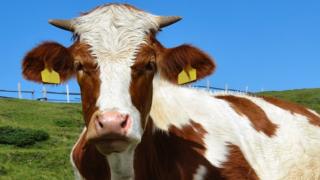
Image copyright
Thinkstock
Animal tuberculosis, which is spread through contaminated food, is a greater threat to human health than previously realised, leading doctors and vets have warned.
The disease can be more serious and harder to treat than conventional, human tuberculosis.
The world has committed to being free of tuberculosis by 2035.
But bodies including the World Health Organization (WHO) say animal TB has been neglected for decades.
Raw or unpasteurised milk is one of the most common sources of the infection.
But animal tuberculosis – officially known as zoonotic tuberculosis – also affects those in close contact with infected animals including vets, farmers and butchers.
Dr Francisco Olea-Popelka, from the Union Against Tuberculosis and Lung Disease, said zoonotic tuberculosis was "far more common than previously recognised".
The best estimates suggest there are around 121,000 new cases of animal TB each year.
The figure is tiny compared to human TB, which is the biggest lethal infection in the world.
But Dr Olea-Popelka told the BBC News website: "I think we should care."
"This is a well-known problem and has been neglected for decades, it is a disease that is preventable, treatable and curable and yet still today we have hundreds of thousands of people suffering from it.
"Ten thousand die every year from this disease, that's a lot of cases compared to many other diseases, why not care?" he added.
He is part of a group – including the WHO, the UN Food and Agriculture Organization and the Stop TB Partnership – that has published a call to action in the Lancet Infectious Diseases medical journal.
Image copyright
Thinkstock
Raw milk is one of the main ways people get zoonotic TB
One of the biggest issues the report raises is the unknown scale of the problem.
Studies in Mexico suggest 28% of all tuberculosis cases are down to zoonotic TB but a study in India put the figure at 9% and one in children in California suggested a figure of 45%.
Dr Paula Fujiwara, from the International Union Against Tuberculosis and Lung Disease, added: "With approximately nine million individuals contracting TB globally each year, even relatively low percentages of zoonotic TB lead to large numbers of people suffering from this form of the disease."
"People living with zoonotic TB require specialized care, but in the vast majority of cases, they are not even adequately diagnosed," she added.
Animal TB is caused by Mycobacterium bovis, which is a different infection to human TB caused by Mycobacterium tuberculosis.
M. bovis is inherently resistant to one of the key drugs used to treat human TB – pyrazinamide.
And Dr Olea-Popelka added: "Once you get zoonotic TB it is often extrapulmonary TB, meaning it is not only in the lungs, but in other organs; that complicates the diagnosis and makes it more difficult to treat."
How to tackle animal tuberculosis will be one of the themes of the Union World Conference on Lung Health taking place later this month.
Dr Olea-Popelka said the key strategies for preventing zoonotic were:
- milk pasteurisation
- farmers, butchers, vets and zookeepers protecting themselves from inhaling bacteria
- and preventing the infection in animals in the first place
Each is easier said than done.
Follow James on Twitter.
Leave a reply







Warning: count(): Parameter must be an array or an object that implements Countable in /home/httpdxfc/say-med.com/wp-includes/class-wp-comment-query.php on line 405